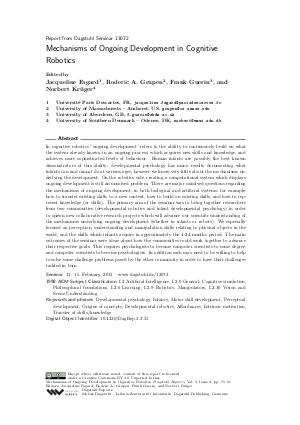Mechanisms of Ongoing Development in Cognitive Robotics (Dagstuhl Seminar 13072)
Authors Jacqueline Fagard, Roderic A. Grupen, Frank Guerin, Norbert Krüger and all authors of the abstracts in this report
-
Part of:
Issue:
Dagstuhl Reports, Volume 3, Issue 2
Part of: Volume: Dagstuhl Reports, Volume 3
Part of: Journal: Dagstuhl Reports (DagRep) - License:
 Creative Commons Attribution 3.0 Unported license
Creative Commons Attribution 3.0 Unported license
- Publication Date: 2013-06-20
File

PDF
DagRep.3.2.55.pdf
- Filesize: 0.74 MB
- 37 pages
Document Identifiers
Subject Classification
Keywords
- Developmental psychology
- Infancy
- Motor skill development
- Perceptual development
- Origins of concepts
- Developmental robotics
- Affordances
- Intrinsi
Metrics
- Access Statistics
-
Total Accesses (updated on a weekly basis)
0PDF Downloads0Metadata Views
Abstract
In cognitive robotics "ongoing development" refers to the ability to continuously build on what the system already knows, in an ongoing process, which acquires new skills and knowledge, and achieves more sophisticated levels of behaviour. Human infants are possibly the best known demonstrators of this ability; developmental psychology has many results documenting what infants can and cannot do at various ages, however we know very little about the mechanisms underlying the development. On the robotics side, creating a computational system which displays ongoing development is still an unsolved problem. There are major unsolved questions regarding the mechanisms of ongoing development, in both biological and artificial systems; for example: how to transfer existing skills to a new context, how to build on existing skills, and how to represent knowledge (or skills). The primary aim of the seminar was to bring together researchers from two communities (developmental robotics and infant developmental psychology) in order to spawn new collaborative research projects which will advance our scientific understanding of the mechanisms underlying ongoing development (whether in infants or robots). We especially focused on perception, understanding and manipulation skills relating to physical objects in the world, and the skills which infants acquire in approximately the 4-24 months period. The main outcomes of the seminar were ideas about how the communities could work together to advance their respective goals. This requires psychologists to become computer scientists to some degree, and computer scientists to become psychologists. In addition each may need to be willing to help to solve some challenge problems posed by the other community in order to have their challenges tackled in turn.
Cite As Get BibTex
Jacqueline Fagard, Roderic A. Grupen, Frank Guerin, and Norbert Krüger. Mechanisms of Ongoing Development in Cognitive Robotics (Dagstuhl Seminar 13072). In Dagstuhl Reports, Volume 3, Issue 2, pp. 55-91, Schloss Dagstuhl – Leibniz-Zentrum für Informatik (2013)
https://doi.org/10.4230/DagRep.3.2.55
BibTex
@Article{fagard_et_al:DagRep.3.2.55,
author = {Fagard, Jacqueline and Grupen, Roderic A. and Guerin, Frank and Kr\"{u}ger, Norbert},
title = {{Mechanisms of Ongoing Development in Cognitive Robotics (Dagstuhl Seminar 13072)}},
pages = {55--91},
journal = {Dagstuhl Reports},
ISSN = {2192-5283},
year = {2013},
volume = {3},
number = {2},
editor = {Fagard, Jacqueline and Grupen, Roderic A. and Guerin, Frank and Kr\"{u}ger, Norbert},
publisher = {Schloss Dagstuhl -- Leibniz-Zentrum f{\"u}r Informatik},
address = {Dagstuhl, Germany},
URL = {https://drops.dagstuhl.de/entities/document/10.4230/DagRep.3.2.55},
URN = {urn:nbn:de:0030-drops-40181},
doi = {10.4230/DagRep.3.2.55},
annote = {Keywords: Developmental psychology, Infancy, Motor skill development, Perceptual development, Origins of concepts, Developmental robotics, Affordances, Intrinsi}
}
